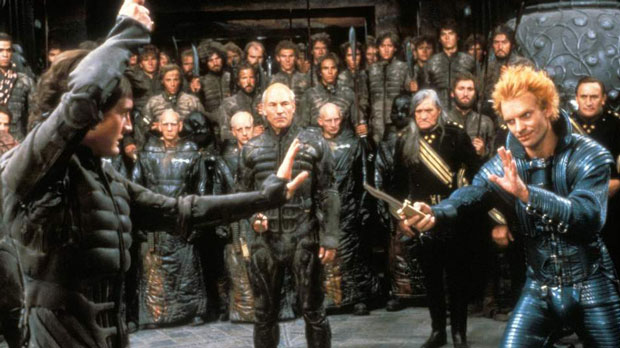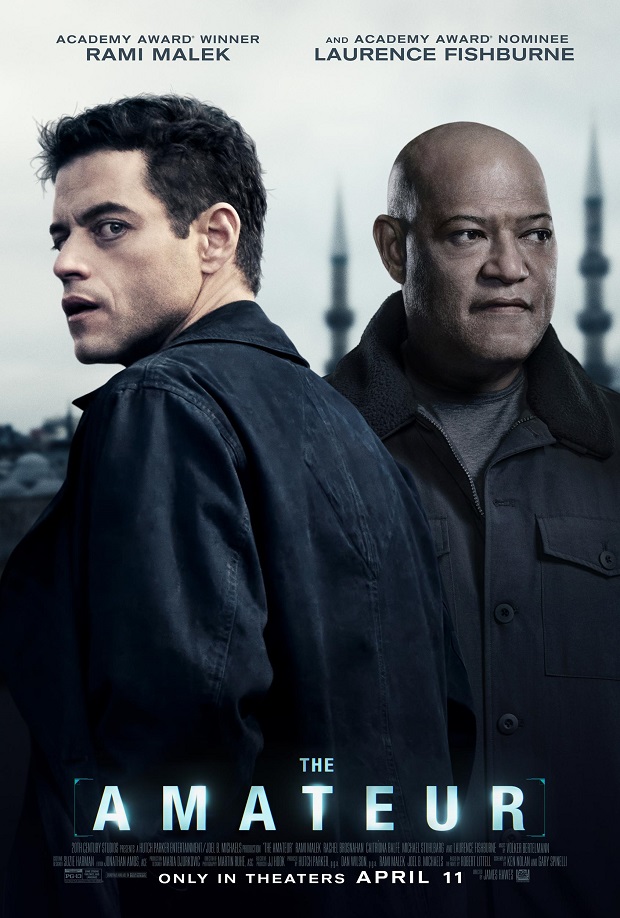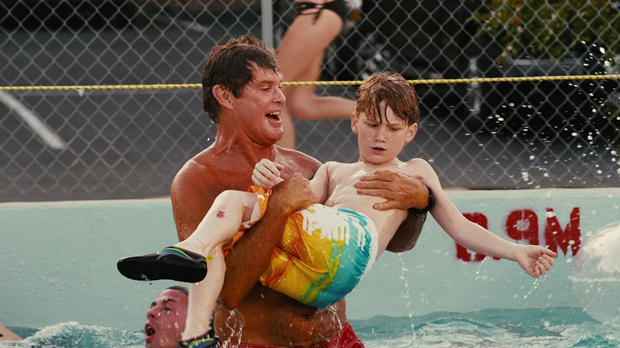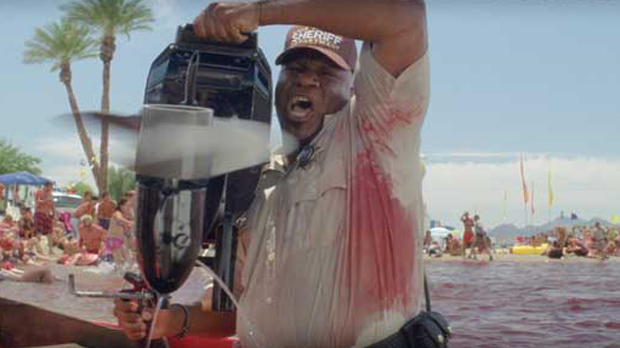 Dune (1984) Universal/Sci-Fi-Action-Adventure RT: 137 minutes Rated PG-13 (graphic violence, frightening images) Director: David Lynch Screenplay: David Lynch Music: Toto Cinematography: Freddie Francis Release date: December 14, 1984 (US) Cast: Francesca Annis, Leonardo Cimino, Brad Dourif, Jose Ferrer, Linda Hunt, Freddie Jones, Richard Jordan, Kyle MacLachlan, Virginia Madsen, Silvana Mangano, Everett McGill, Kenneth McMillan, Jack Nance, Sian Phillips, Jurgen Prochnow, Paul Smith, Patrick Stewart, Sting, Dean Stockwell, Max von Sydow, Alicia Roanne Witt, Sean Young, Danny Corkill, Honorato Magalone, Judd Omen, Molly Wryn. Box Office: $30.9M (US)
Dune (1984) Universal/Sci-Fi-Action-Adventure RT: 137 minutes Rated PG-13 (graphic violence, frightening images) Director: David Lynch Screenplay: David Lynch Music: Toto Cinematography: Freddie Francis Release date: December 14, 1984 (US) Cast: Francesca Annis, Leonardo Cimino, Brad Dourif, Jose Ferrer, Linda Hunt, Freddie Jones, Richard Jordan, Kyle MacLachlan, Virginia Madsen, Silvana Mangano, Everett McGill, Kenneth McMillan, Jack Nance, Sian Phillips, Jurgen Prochnow, Paul Smith, Patrick Stewart, Sting, Dean Stockwell, Max von Sydow, Alicia Roanne Witt, Sean Young, Danny Corkill, Honorato Magalone, Judd Omen, Molly Wryn. Box Office: $30.9M (US)
Rating: ****
One of the biggest critical and commercial bombs of the 80s also happens to be one of my all-time favorite science fiction movies. It didn’t start out that way. I absolutely hated Dune the first time I saw back in January ’85. I thought it was a plodding, confusing, incomprehensible, ugly mess. I was lost ten minutes into it. It was a real struggle to stay awake. I decided to rewatch it when it premiered on cable TV that November. I had nothing better to do that night and I could always turn to whatever shows were on regular TV that night if I got bored.
A funny thing happened that night; I started getting into Dune. The pieces of the puzzle started coming together and the plot made a lot more sense. I realized that it wasn’t your typical post-Star Wars sci-fi film; rather, it was a more serious picture with religious overtones and Shakespearean-like themes of betrayal and revenge. If I was to describe the plot in a single sentence, it would go something like this: A young man discovers that he may the prophesied messiah (the “Kwisatz Haderach”) that will someday lead the universe. Of course, that’s an oversimplification of the dense, multi-character plot. There’s a lot going on in Dune and it’s pretty cool once you understand it.
Based on the popular 1965 novel by Frank Herbert, the movie pulls the viewer right in with a secret plot by the Emperor (Ferrer, The Evil That Men Do) to lure Duke Leto Atreides (Prochnow, The Keep) into a trap as he’s become a threat to the ruler. He intends to give House Atreides control of Arrakis (aka Dune), the desert planet where the spice mélange is produced. It’s explained in the opening narration by Princess Irulan (Madsen, Electric Dreams) that mélange is the most important substance in the universe because of three things: (1) it extends life, (2) it expands consciousness and (3) it allows its users to “fold space” (to travel instantaneously to any part of the universe). Are you with me so far? At an appointed time, the Harkonnens, led by the sadistic Baron (McMillan, Ragtime), will stage an ambush and annihilate House Atreides. The two houses have a long-standing feud and the Emperor plans to exploit it for his own personal gain. There’s just one thing, a representative of the Spacing Guild wants him to have the Duke’s son Paul (MacLachlan, Blue Velvet) killed. The young man has prophetic dreams and poses a real threat to the Guild.
I won’t go into all the details of the plot; it’s much too complicated to explain in a review of reasonable length. Instead, I’m going to jump ahead and tell you that Paul ends up leading an army of Fremen, a mysterious race of people who live deep in the desert, against House Harkonnen and halting spice production on Arrakis. All the while, he keeps having prophetic dreams that ultimately lead him to take “The Water of Life”, a poisonous substance that will determine whether or not he’s the Kwisatz Haderach. Did you follow all that?
Dune became a life-changing experience by introducing me to David Lynch, the surrealist filmmaker behind such movies as Eraserhead, The Elephant Man, Blue Velvet, Wild at Heart, Lost Highway and Mulholland Drive. It was his work on Dune that made me see the brilliant Blue Velvet in September ’86. In short, he’s my favorite movie director. He’s not proud of his work on Dune; there was a great deal of interference from the studio who insisted on a shorter cut of the movie (Lynch’s cut was three hours long). He has since distanced himself from the film; he won’t discuss it in interviews and the subsequent extended cut shown on broadcast TV bears the infamous pseudonym Alan Smithee. He’s not the first director to harbor negative feelings towards his own work, but it’s one of the few times that I think it’s unjustified.
In my not-so-humble opinion, Dune is brilliant. I realize that it has its flaws, but I can overlook them because of the sheer magnitude of this ambitious cinematic undertaking. It’s still a narrative mess with too many unexplained characters and unclarified relationships. For example, why is the princess even in the movie? Besides providing voice-over narration, all she does is stand around looking worried about something. Those familiar with the novel know her purpose in the story, but the makers of the film scrapped it along with several other plot points. In other words, it helps to have read Dune before seeing the movie. I have yet to read the entire novel, but I’m familiar with some of the major differences between the two.
One of the best things Dune has going for it is the cast. It’s an impressive assemblage of talent, that’s for sure. I now have the opportunity to mention some of the story’s other characters. Brad Dourif (The Exorcist III) plays Piter de Vries, a Mentat (essentially, a human computer) who serves Baron Harkonnen. Sting (of The Police) and Paul Smith (Popeye) are Feyd-Rautha and The Beast Rabban respectively, the Baron’s twisted nephews. Francesca Annis (Krull) is Lady Jessica, mother of Paul and member of the telekinetic Bene Gesserit sisterhood. Dean Stockwell (Married to the Mob) plays Dr. Yueh, personal physician to the Duke. Sean Young (Blade Runner) is Chani, Paul’s Fremen lover. Sian Phillips (Clash of the Titans) portrays the Bene Gesserit Reverend Mother who fears that Paul might really be the Kwisatz Haderach.
Yes, Dune is very crowded, but that’s part of its cool factor. Also contributing to this are some cheesy special effects and goofy portentous dialogue. It’s amazing that the actors manage to deliver their lines while keeping a straight face. As for the effects, they don’t necessary look horrible, but they don’t stand up under close scrutiny either. The giant sand worms look really cool, but it’s obvious that they’re animatronic creations. The score by rock group Toto is a real asset.
Many are put off by the weird tone and incomplete feel of Dune, but that’s only because they’re approaching it like a normal, mainstream sci-fi movie. What you want to do is just sit back and let Dune happen. Let it wash around in your mind for a while. Look at it as a nightmarish vision of a very distant future (the year 10,191 to be exact). The imagery and set design evoke feelings of discomfort and fear. The industrial home planet (Giedi Prime) of the Harkonnens, the severely mutated members of the Spacing Guild, the sight of the obese, deformed Baron floating around by way of a propelled anti-gravity device, the “Hunter-seeker” (a floating, hypodermic needle-shaped device) used in an assassination attempt and many other things. Lynch also makes excellent use of sound in providing a suitably nightmarish atmosphere to the proceedings. All I can say is “WOW!” Dune serves as proof positive that giving certain movies a second chance can be rewarding. This movie is freaking awesome!




